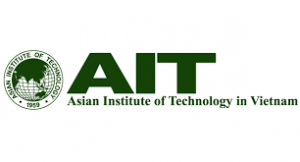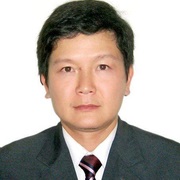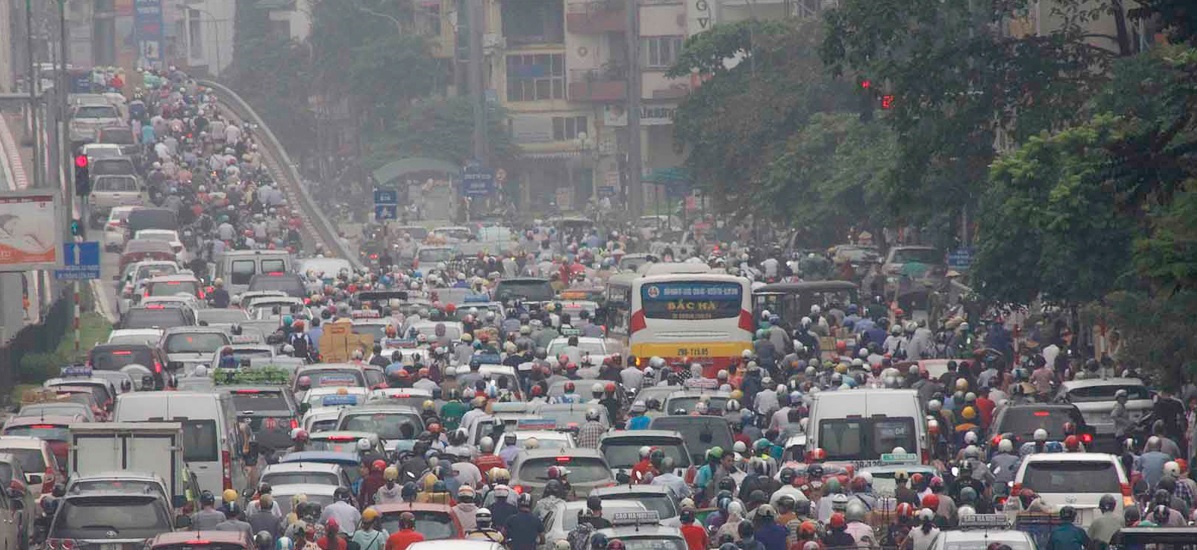‘In Vietnam, people are more focused on economic development and do not take care about environment very much’, says Ngo Tho Hung, environmental scientist and Head of Environment Development Section (EDS) at Asian Institute of Technology in Vietnam (AITCV) in Hanoi, Vietnam. Ngo Tho Hung, who holds a PhD degree from Roskilde University in Denmark, is disappointed with the limited budgets allocated for scientific activities in Vietnam.
In 2003, Dr. Ngo Tho Hung graduated with a Master’s degree in Environmental Engineering from the National University of Civil Engineering in Hanoi. Already since 1997, Ngo Tho Hung worked for the Environmental Technology Department at the Vietnam Institute for Building Science and Technology as a researcher and consultant on a range of projects funded by DANIDA, WB, SIDA, CIDA, ADB, USAID, JICA, KOIKA covering environmental technology and management under Ministry of Construction and Ministry of Environment and Natural Resources, Ministry of Agriculture and Rural Development, Ministry of Investment and Planning.In 2007, Ngo Tho Hung was granted a full three year PhD scholarship co-funded by the Vietnamese government, DANIDA, and the National Environmental Research Institute (NERI), Denmark. He was appointed as a staff at NERI. The overall theme of the PhD project was technology transfer and science application in international co-operation on Environmental Protection and Sustainable development. The analytical framework at this level included concepts on Results Oriented Approach to Capacity Development and Change (ROACH) and the DPSIR concept (Driving force-Pressure-State-Impact-Response) for analysing complex environmental problems. The specific focus was Urban Air Quality Modelling and Management in Hanoi Vietnam, and the research question was: How to apply a dispersion model to cities in the developing world, where model input data and data from air quality monitoring stations are limited or of varying quality?
‘Air Pollution Modelling at Road Sides Using the Operational Street Pollution Model – A Case Study in Hanoi, Vietnam’
The estimation of air pollution at the street level is required for health impact assessment. Two dispersion models were applied and evaluated: The Operational Street Pollution Model (OSPM), developed by NERI, was used for five streets in Hanoi, Vietnam, and an operational meteorological air quality model (OML) was used at the urban background scale. At the time, NERI was not part of Aarhus University, thus Hung was enrolled for the PhD degree at the Doctoral School of the Department of Environmental, Social and Spatial Change (ENSPAC), Roskilde University (RUC). Senior researcher Steen Solvang Jensen, NERI, and Professor Henning Schroll, RUC, served as PhD supervisors.
On July 16, 2010, Ngo Tho Hung submitted his Ph.D. dissertation for assessment at RUC. The dissertation included an article entitled ‘Air Pollution Modelling at Road Sides Using the Operational Street Pollution Model – A Case Study in Hanoi, Vietnam’ [1], that was accepted for publication by the Journal of the Air & Waste Management Association (A&WMA,USA). The study in Hanoi revealed the challenges of applying dispersion models in a context where high quality model input data and high quality measurements are unavailable. In the case study, the three tools (emission inventory, monitoring, and modeling) are used together in an integrated approach of adjustment, evaluation, and refinement. Each tool is used to help in identifying the shortcomings of the others and to identify what improvements are needed. This is an adapted integrated monitoring and assessment (IMA) concept applied for developing countries.
Hung argues that local input data will enable the dispersion model to describe the actual pollution level better at street scale. Motorbikes are the dominant vehicle category in Hanoi. Again, further studies on the emission factors for all vehicle categories reflecting the specific Vietnamese conditions should be conducted. The street types should be categorized according to their corresponding vehicle volume. Such data must be annually updated to a GIS database. Also, Traffic Produced Turbulence (TPT) by motorbikes must be considered as a significant contributor to the circulation of air pollution at street scale due to the low wind speed condition and street configurations.
For industry, Hung recommends to move polluting factories out of the residential areas and to shift the energy source from fossil coal and kerosene oil to gas. From a meteorological point of view, new and existing factories using polluting fuels should be relocated to areas North West or South West from Hanoi center.
Back in Hanoi
Hung was a representative key member of Model Inter comparison Study Asia Phase II (MICS-Asia II) 2004-2009. Upon returning to Vietnam, he worked for a World Bank project to build up The Mobile Emission inventory for Hanoi. Also, Hung was teaching as well as supervising and mentoring PhD students from Hanoi University of Science, VNU.
Today, Ngo Tho Hung works for Asian Institute of Technology in Vietnam (AITCV) as the Head of Environmental Technology and Development Section. He is responsible for teaching capacity building in Environmental and Development and for the development of the Section’s business strategy. At AITCV, Hung serves as a project manager and consultant on environmental science, sustainable development, green growth, climate change, and adaptation measures. He has worked on projects funded by Asian Development Bank, World Bank and other international donors.
Air pollution levels in Hanoi remain alarmingly high. Between March 1 and 4, 2016, the Air Quality Index (AQI) measurements by the Hanoi-based US Embassy recorded pollutant concentrations in the air ranging between 114 and 159 during the day. At 9am on March 1, 2016, it suddenly peaked at 388, a level deemed hazardous and which can cause serious health problems. Also, the PM2.5 particulate level recorded was seven times higher than the permissible level set by the World Health Organization. ‘If the pressing problem is not properly grasped and addressed, Hanoi and Ho Chi Minh City might become polluted just like Beijing in the not-too-distant future,’ Hoang Duong Tung, deputy director general of the environmental directorate stated. Then, on October 5, 2016, Hanoi’s Air Quality Ranked Second-Worst in the World.
Soft skills gained from study stay in Denmark
Ngo Tho Hung: ‘After learning and working in Denmark, I have gained a quite strong background on how to make things possible in different contexts and situations. This is very applicable in carrying out development projects in Vietnam. Being a leading consultant, working with different stakeholders enabled me know how to manage the consulting activities in the most efficient way and applying best practice, especially in providing technical and policy advice on climate change and disaster risk management.
I have gained good people management skills from a diversity of job positions in Vietnam and Denmark, Thailand, South Korea, and Japan, moving from assistant, researcher to project manager. The understanding of diversity and multicultural working environment from East to West made me good on the ability to promote a strong team environment where skills and ideas are respected and valued. The experiences of teaching & supervising master students at Department of Environmental, Social and Spatial Change, Roskilde University, Denmark (teaching is required by Denmark law for a PhD degree) helped to develop my coaching and mentoring skills. The experience with international projects on technology transfer and international co-operation enabled me to build relationships and partnerships, including working across a range of different stakeholders to build consensus on a proposed approach’.
[1] See also: Hung, Ngo Tho, and Jensen, Steen Solvang 2012. Integrated monitoring and assessment for air quality management in Hanoi, Vietnam. VNU Journal of Science: Earth and Environmental Sciences 28 (2012) 69-83.

Asian Institute of Technology in Vietnam (AIT-VN) was established in 1993 under the agreement between Vietnam government (MoET) and AIT. AITVN takes pride in being the first international educational institution in Vietnam and the first centre of AIT out of its headquarter in Thailand.
Since 1993, AIT has graduated more than 3,000 Masters and PhD holders, and 20,000 professionals in Vietnam who now hold important positions in both public and private sectors. AIT in Vietnam has three main offices in Hanoi, Ho Chi Minh, and Can Tho; and several program offices in Dong Nai, Vung Tau, Tra Vinh, and Da Nang. AIT activities cover all 61 cities and provinces in Vietnam. Over 200 different short training courses in 20 major focus areas are offered. AIT in Vietnam currently offers 15 different postgraduate programs, including two-stage masters and doctoral programs, professional masters programs, and international masters of advanced studies. AIT training-cum-study tours are organized in different countries and regions worldwide, including Thailand, China, Singapore, Malaysia, Singapore, South Korea, Philippines, Laos, Australia, New Zealand, Europe and USA. AIT-VN Consultancy Services include five broad areas: Education and Training, Project Management & Evaluation, Environment, Community Development and Capacity Building.
Our Mission
The mission of AITVN is to train future leaders using high quality education and training, research (in sciences, education, engineering and management) and sustainable development of Vietnam and the region.
Our Vision
Our vision is to become a prestigious regional institution that offers international quality, innovative, and work-relevant higher educational opportunities for the sustainable growth of the region.
Why AIT-VN?
AIT in Vietnam is committed to an international quality higher education. This combined with its long history in Vietnam and associated in-depth insights into legal, economic and political landscape, social and cultural trends provide AIT with comparative advantage not available to any other international institution of higher learning in Vietnam.

Ngo Tho Hung



